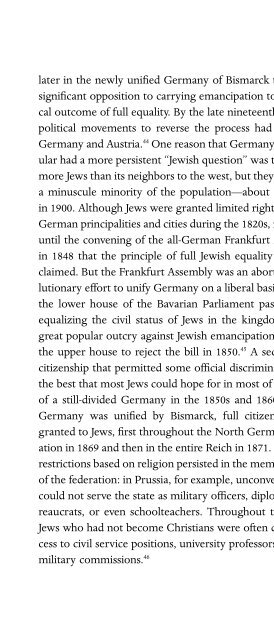Racism - A Short History - George M Fredrickson.pdf - WNLibrary
Racism - A Short History - George M Fredrickson.pdf - WNLibrary
Racism - A Short History - George M Fredrickson.pdf - WNLibrary
You also want an ePaper? Increase the reach of your titles
YUMPU automatically turns print PDFs into web optimized ePapers that Google loves.
APPENDIX <strong>Racism</strong> in Historical Discourse<br />
race pure from the contamination of Negro (or Southern<br />
European or Jewish) ‘blood.’” In a misguided attempt at<br />
evenhandedness (similar to that of Hirschfeld), he opined<br />
that “[t]he Semite himself is race conscious and given his<br />
chance, just as scornful and prejudiced as the Aryan who<br />
would oppress him.” 23 Barzun conveyed how broadly he<br />
conceived of his subject when he broke European racism of<br />
the late nineteenth century into four distinct tendencies:<br />
(1) racializing the rivalry between Germany and France as<br />
Aryanism versus Celtism; (2) attributing the rise of socialism<br />
to a Jewish conspiracy; (3) asserting that the German races<br />
are rising and that the Latin races are declining; and (4)<br />
believing that civilized whites must unify to hold in check<br />
“the colored hordes of black, red, and yellow men whom<br />
they have aroused from their ancestral torpor, else European<br />
culture—or rather civilization itself—is doomed.” He<br />
concluded: “No European figure of any importance in any<br />
walk of life escaped, during that period [1870–1900], the<br />
contamination of one or more of these beliefs.” 24<br />
Despite being aware of the full scale of his subject, Barzun<br />
concentrated almost all of his attention as a historian<br />
of ideas on those thinkers who laid the foundation for the<br />
Nazi embrace of Aryanism. Yet the specifically antisemitic<br />
application of Aryanism receives surprisingly little attention.<br />
“Race in Germany,” he explained, “was a means to<br />
give back to the German people a feeling of self-respect<br />
after the national humiliation at Versailles and since.” He<br />
then went on to describe similar uses of racism for the purpose<br />
of “national uplift” in other times and places. 25 No<br />
mention was made of the Nuremberg Laws of 1935, which<br />
made racism official policy to a degree unparalleled in<br />
164
















